
Former Colombian presidential candidate Ingrid Betancourt was kidnapped by FARC rebels and held hostage in rebel camps in the middle of the jungle for nearly six-and-a-half years before she was freed in a dramatic military rescue in July of 2008 that made international headlines. She has just published a harrowing account of her time as a hostage of FARC, the abuse she endured, and her numerous unsuccessful attempts to escape.
Click here to watch Part I of the interview
Part II begins with Betancourt describing how she and the other hostages came to understand they had been rescued.
AMY GOODMAN: Ingrid Betancourt, so you’re in the plane. The guerrilla captors have come with you, leading you absolutely to believe you’re just being shifted from one place to another. The other hostages felt the same as you. Didn’t you have a kind of sit-down where you all didn’t want to get in the plane?
INGRID BETANCOURT: We didn’t want to get in the plane. Actually, for us it was, I mean, a plane servicing the FARC. It meant ten years more of abduction. So it was the worst that could happen. And when we — well, actually, we were forced to get into the plane. And once we were in, I remember like trying to talk to my fellow hostages, because we all had the sensation that perhaps it was the moment to do something. We were — there were more prisoners than other people, so we thought perhaps we could do something.
And then, it happened very quick. The crew that had come and that we thought were working with the FARC neutralized the two commanders that were in the plane with us, two guerrilla commanders. And it happened very quick. And then I saw my fellow hostages kicking the commanders and beating them, and I was like horrified. I said — because I don’t like violence in any way. So I was — I didn’t like what I was seeing. But then it was very quick, and they neutralized the guys. And the command — I mean, the leader of the coup screamed, and I remember it was the huge scream, because we had the helicopter noise. And he said, “We are the Colombian army. You are free.”
And that was, for me, a shock. And I remember that I couldn’t help myself but scream. And it wasn’t something that I wanted to do. It just happened. I was screaming and screaming and screaming, and I remember thinking, “You have to stop screaming. That’s insane. You’re like a madwoman. You have to stop.” But I couldn’t. It was just like energy that was just breaking through me. And when I managed to calm down, I saw that my fellow hostages were exactly doing the same thing I was doing. We were all screaming and jumping and shouting and crying. And then I realized that I was free.
And I remember looking at William, that was just beside me, one of my fellow hostages. And when I met his eyes, I understood we were having the same feeling, which was fear — fear of this new life that was just jumping on us, and that we didn’t know how to — we didn’t know what was coming for us afterwards.
AMY GOODMAN: What did come? Where were you then taken? And then talk about the reunion with your family.
INGRID BETANCOURT: Well, what came afterwards was an eternal flight until we landed in San José del Guaviare. It was just a five-minute flight, but it was like an eternity for me, I remember. And I thought that we were going to crash, because I had been like in this ill fate for so long, I couldn’t believe this joy was something that could happen to me. So we landed, and the helicopter opened, and we all run outside. And we were taken into the other plane, the presidential —- the Colombian presidential plane, and we were flown to Bogotá. And when I was in Bogotá and the door opened and I went down the stairs and I saw my mom, there were so many things I was thinking. I could see in her face all the pain. And I thought she was so beautiful. It was incredible, like it was done. It was the end of the nightmare.
AMY GOODMAN: And then your children, who were children when you left them.
INGRID BETANCOURT: Yes, and -—
AMY GOODMAN: How old were they when you were captured in 2002?
INGRID BETANCOURT: Lorenzo was thirteen, and I remember he was a boy. He wasn’t even an adolescent at that time. He was really a boy still. And Melanie, she had begun to be a little woman. She was sixteen. And during all those years, I remember trying to figure out in my head how they could be physically. I had heard once my boy, and his voice had completely changed.
AMY GOODMAN: You heard him on the radio.
INGRID BETANCOURT: On the radio. And it was a shock, because in his voice, I thought it was his boy’s voice, like I remember, but then there was another mature voice that I recall as being like my father’s voice. So I didn’t know what to expect. I thought that they must be beautiful adults now. But you see, when I saw them the first time, I thought they were much better, much beautiful, much more beautiful than what I thought they could be.
AMY GOODMAN: And was it there, after you had seen your mother, that you saw them?
INGRID BETANCOURT: No, it was the next morning, because they had to fly from France. When I saw my mother, that moment after seeing my mother, I had this impression of being blessed. And I remember I got on my knees. It was a very intense moment, and it still is, because I feel still blessed, you know? Every time I wake up, I have the sensation of needing to give thanks.
AMY GOODMAN: Your father died during your captivity.
INGRID BETANCOURT: Yes, my father died, exactly hour to hour a month after my abduction. And I always thought that was also his way of — it was a love, you know, thing, just dying like exactly.
AMY GOODMAN: He was very important to you. And you had spent a good amount of time right before you went on that final trip where you were captured, because he had been in the hospital.
INGRID BETANCOURT: Yes.
AMY GOODMAN: So you had spent weeks with him.
INGRID BETANCOURT: Yes.
AMY GOODMAN: And you got his blessing to go.
INGRID BETANCOURT: Yes. We had this discussion just the day before I took the plane to Florencia, to San Vicente, because I didn’t want to go. I didn’t want to go to that trip. And I remember his saying to me, “Look, you gave your word. You have to go. And I’ll be waiting for you.” And I made him promise that he was going to wait for me. And I remember he had this kind of — he said, “Of course I will wait for you. If God wants me to.” And he blessed me. And he said those incredible words. He had this image of Christ resurrected in his room, and he turned to this image, and he said, “Jesus, take care of this child.”
AMY GOODMAN: You learned of his death in captivity by seeing it in a newspaper a month after he died.
INGRID BETANCOURT: Yes.
AMY GOODMAN: Explain.
INGRID BETANCOURT: A month after his death, and I mean, by chance, because there was an arrival of provisions to the camp, food, and it would arrive like every three weeks. And curiously enough, there were vegetables coming, which was very rare — almost it never happened. And the vegetables were wrapped in newspaper sheets. So, because we had nothing to read, I asked the commander if we could just have those newspaper pages to read something. And he agreed. And so, I remember taking the pages and putting them flat. And then the first one I had in front of me, there was this picture of a priest, like, with a very strange face, like very angry, looking at some journalists taking pictures of something. So I read the caption, because I was curious to know why he had this face. And the caption said something like, “This priest is very annoyed and surprised because of the hive of journalists around Gabriel Betancourt’s coffin.” And that’s how I learned.
AMY GOODMAN: The guerrillas knew before you did.
INGRID BETANCOURT: Yes, they knew, because I remember that they had taken away all the radios around us, and every time I would ask for a radio to listen to, they would say that there were no more batteries. And I was — you know, no more news about anything. And then I realized it was because they didn’t want me to know that my father had died.
AMY GOODMAN: Why?
INGRID BETANCOURT: Because I think they could expect me to try to just do something, kill myself or run away. And, in fact, I had just run away before that. And when I read those pages, I was chained to a tree, because — as a result of the punishment of an attempt of escape that I had made just before.
AMY GOODMAN: Can you describe that escape, what it meant to try to leave this camp, this prison, where you stayed? You talked about the cage, Ingrid Betancourt.
INGRID BETANCOURT: Yes. Well, they had — well, there were, I mean, several attempts of escape. The one before my father died, or before I realized he had died, I was in a camp where we were surrounded by all the tents of all the other guerrillas, and there were guards in shift turns, twenty-four hours a day, of course. And I had prepared my escape in all details, trying to see what was the best time to just run away and all the provisions we had to take and everything. And I had also prepared my companion, Clara, which was with me.
AMY GOODMAN: Who was your campaign aide who came on at the very last minute.
INGRID BETANCOURT: Yes, yes.
AMY GOODMAN: You didn’t even necessarily want her to come, but she said, “I really want to be a part of this campaign.”
INGRID BETANCOURT: Yeah. And so, she was abducted with me. And so, we were together planning everything, little things like, for example, what we were going to eat. And we had nothing, I mean, to really, you know, put us something that we can take away. And I remember, for example, saving some vitamins that I had with me in the moment of abduction, thinking that’s a good thing — if we don’t have nothing, we can just eat those vitamins, it will help; or making like a shape of a person, to leave it where we were supposed to sleep, and we made it with a bag filled with paper, so it — you know, to create a volume that they could just take as a body and not realize that we had escaped; choosing also what we were going to wear as shoes, because if we took the boots, the rubber boots they had given us, they would immediately know that we had run away, so we were planning to take the shoes we had when we were abducted, that we still had at the moment. And little things like that. We had a machete we had managed to steal from them, and they didn’t know we had it. So we had to just hide it in a place, an awful place, by the way, because I had thought the best way to hide it was in the chontos, the area where we were using as toilets. And, well, all those little details, we had to just take care of.
AMY GOODMAN: And you loosened an old, rotten, wooden shingle that was part of the wall of your cage, of your little — the house that you stayed in.
INGRID BETANCOURT: Yes.
AMY GOODMAN: Not house, but —-
INGRID BETANCOURT: Yes. And then, for that escape, which was another one -— this was the fourth escape — that one, we were in another camp, and they had built a cage, so really a cage, a wooden cage, and it was impossible just to escape. But I had noticed there was a rotten wooden plank, and one day I just gave a kick, and it made a crack, so I knew that if I forced it a little bit more, I could just have a hole to go out. But I needed a storm, because the rain would hide the noise of opening the plank. So I was waiting for that night with a storm. And when it came, after like a month without rain, and I opened the hole, I was — I managed to just go out, but Clara didn’t come with me. And then that escape was very difficult because it was — it was a storm, under a storm, no lights, in pitch black night, and in this forest that was so aggressive, with all kind of, you know, dangers in the jungle.
AMY GOODMAN: Can you read — that was such a graphic part of the book, when you made your way out, but then you hesitated because Clara hadn’t followed behind. I think it goes to your state of mind and what it meant when they came at you.
INGRID BETANCOURT: OK, yes.
“The rain stopped completely, and darkness fell like a lead curtain. I thought I could see my companion’s silhouette inside the cage, thirty yards or so from my hiding place. She had just lit a candle, a very rare privilege; as prisoners, we were not allowed to have light. She was talking with someone, but it wasn’t the commander. The voices were calm, as if restrained.
“As I looked at this inaccessible world, I found myself almost regretting the fact that I was alone and drenched and shivering. It would have been so easy, so comfortable, so tempting to admit defeat and return to that warm, dry place. I contemplated the patch of light and told myself that I couldn’t afford any self-pity, and I said over and over, You have to go, you have to go, you have to go!
“Painfully I tore myself away from the light and plunged into the thick, matted darkness. It had begun to rain again. I had my hands out in front of me to avoid obstacles. I hadn’t managed to get hold of a machete, but I did have a flashlight. The risk of using it was as great as the fear of doing so. I went slowly into this threatening space and told myself I would switch it on only when I couldn’t take the darkness anymore. My hands collided with wet, rough, sticky surfaces, and at any moment I expected to feel the burn of some lethal poison.”
AMY GOODMAN: And then you were discovered.
INGRID BETANCOURT: And then I was discovered.
AMY GOODMAN: By a woman guerrilla.
INGRID BETANCOURT: By a woman guerrilla.
AMY GOODMAN: And she said she would like to run away with you.
INGRID BETANCOURT: Yes. She told me that she understood I was wanting to run away, that she also had a baby that she had left with her mom, and that sometimes she felt that she needed to just run away from the guerrillas and get her freedom back to stay with her child. But she couldn’t. And I said to her, “But we could run away together. You know how to get out of here. I don’t, but you know. We could succeed in doing this.” And she said, “No, we wouldn’t succeed. And they would find us, and they would kill us.” And so, she asked me to just follow her.
AMY GOODMAN: And you did, and you were — and she told you they would brutalize you —-
INGRID BETANCOURT: Yes.
AMY GOODMAN: —- that the orders were there to brutalize you —-
INGRID BETANCOURT: Yes.
AMY GOODMAN: —- but that you shouldn’t respond.
INGRID BETANCOURT: Yeah, she said, “Don’t excite them with any response. Just don’t do anything, because they have the order to, I mean, punish you.”
AMY GOODMAN: So, let’s talk about what you feel, Ingrid Betancourt — you were a presidential candidate in Colombia — what you feel needs to happen. I mean, ironically in all of this, you were the one — and this is why you were in a vulnerable position — who wanted there to be negotiations with the FARC, who wanted to talk to them, who did talk to them.
INGRID BETANCOURT: Yes. And I think that there’s no other way but negotiating. I really believe that that’s something that we will come up to negotiating in one time or the other. It will happen. I also think that because the guerrilla has — have deviated from their first motive of existing, which was to have a better Colombia and a way to have better democracy, I think that today that’s not the target anymore. I think they are now more drug cartel than anything else. And because this war has dragged on for so many years, and they understand that they cannot take power by fighting the army, because the army is too strong, they have been — a sort of complacency towards themselves in accepting that they can just linger in their way of living, because they can make money through the drug trafficking and they can buy weapons, and so they can secure a part of the territory where they are masters, and they can control the lives of the people living there, and they can decide if they are going to live or to die. And that power is something, I think, that they cherish more than anything. And that’s why it’s important for the Colombian army to continue putting pressure, to the point where they will realize that that way of living is not more — anymore possible. And then they will have, like, the decision to just negotiate.
AMY GOODMAN: I wanted to ask your views of the previous president, Uribe, who you were very critical of. Santos, the current president, was the man in charge of the military, was the man in charge of the operation that freed you.
INGRID BETANCOURT: Yes. You see, my family and many of the families of the hostages always thought that a military rescue was something that had not to be attempted because of the risk of losing our lives. On the contrary, as a victim, I always thought that it was our right to be rescued and that I preferred to have to put my life at risk than to just have twenty years more in the jungle as abducted, because I thought that it wasn’t fair for my children and for my family to just put their lives into parentheses, just stop living their lives because they were waiting for me. And I wanted to have the opportunity to be rescued, as I wanted — and I always did whatever was possible to escape, even though it was a huge risk also of being captured and killed.
AMY GOODMAN: Why do you think the US military contractors, the Northrop Grumman three men, are so hostile towards you? Do you think it had to do with the — your political point of view, what you represented as a Green Oxygen presidential candidate? You spoke actually very warmly, especially about one, Marc Gonsalves.
INGRID BETANCOURT: Yeah.
AMY GOODMAN: You describe your moments with him as he came to listen to his mother speak on the radio.
INGRID BETANCOURT: Yes. And actually, I love them like my family. They were my family for so many years. I mean, I cannot — I mean, if they have been very harsh on me, I think it’s because — well, first, it’s not all of them. There were three, and it’s just one, Keith, that has this kind of very strong character. And he didn’t like me from the beginning, I think, because he resented a lot the fact that I was like considered the prominent kidnapped person. My name always was jumping up in the news. And I think he was thinking that his name should come up, too. And I think that all names should come up, too. But at that moment, that was the way it was happening, and I had no control of that. And he’s —-
AMY GOODMAN: Their plane was downed, the three of them, and they were captured.
INGRID BETANCOURT: Yes, yes. And, well, there were many things that happened, I think, that were also -— we were manipulated by the FARC. We were loaded with wrong information. I know that they were — the FARC were telling them all kind of wrong things about me. And I was told all kind of horrible things about them. And in a way, even though you know those are things they give to you to manipulate you, because the reaction is so aggressive, I remember when Keith would come to me in a very aggressive way, I would know that he was reacting like this because he had been filled with wrong information about me. But because he was aggressive, I would react also in a bad way, because I was harmed with what he was saying to me, you know? I think we were not behaving — any of us — like the heroes we would have wanted to be. We were just our little ourselves. But what I also think is that, despite of that, looking back to all the harsh conditions we were confronted to live, I think we were the best we could be. And that’s why I cannot feel that resentment to any of my fellow hostages, because even if we had moments that were very difficult, even if we had confrontations, for me, they are — they are the only people that can understand what I lived and what I went through. And today, when I speak with Marc or with Tom or with any of my fellow hostages, the only thing that remains is an incredible solidarity and love. And that’s, for me, the most important thing.
AMY GOODMAN: Will you reenter politics in Colombia?
INGRID BETANCOURT: I always say no, because today, as I am today, I feel the need of reconstructing my life, and I think that I’m still very wounded, and I need to have time to just, you know, heal the wounds. But I can — I learned in the jungle not to say “ever” ever, because that’s something that life brings to you afterwards. And what I know is that if I would have the opportunity to serve my country in a way that I would feel that I would feel comfortable, and not having to deal with all those horrible things I found in politics — the lies, the manipulation, the — what politics is today that brings mostly the bad things in humans and not the good things, if there was, you know, a break and I could see that there was something that I could do differently, doing politics in a different way, and that I could have the backup of the people of my country, I would do it.
AMY GOODMAN: Ingrid Betancourt, I want to thank you very much for spending this time with us.
INGRID BETANCOURT: Thank you, Amy.
AMY GOODMAN: Thank you.

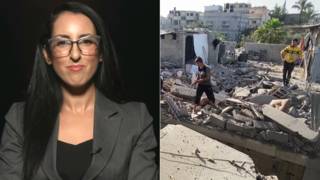
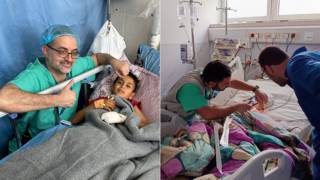
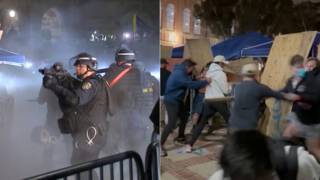
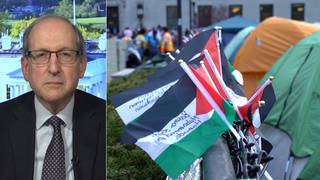





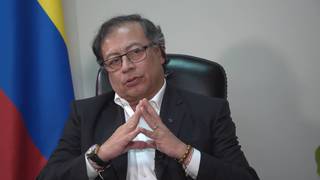
Media Options